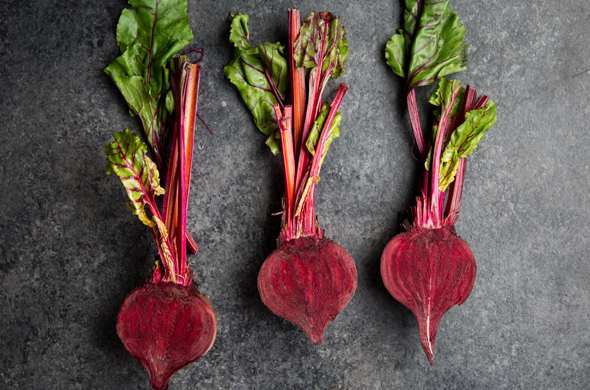Beneficial. Bountiful. Beets. Aside from their beautiful color, this superfood is rich in a variety of vitamins, minerals, and antioxidants that support your body’s natural detoxification processes. Add them to your smoothies or salads – your body will thank you!
Beets are a root vegetable with a rich color that sparks a craving for their earthy sweetness. The earliest sign of their cultivation was approximately 4,000 years ago in the Mediterranean region. In Greek mythology, Aphrodite, the goddess of love, ate beets to enhance her appeal. A natural source of tryptophan, beets are a building block for protein, serotonin, and the hormone melatonin.
Beets contain a substance called geosmin, which is responsible for that fresh soil scent in your garden following a spring rain. Humans are sensitive to geosmin, which explains why our beet response ranges from one extreme to the other.

Nutrition
One Serving of chopped raw beets (107g)
- Calories: 25
- Carbs: 13g
- Sugars: 9.19g
- Calcium: 31mg
- Magnesium: 16mg
- Potassium, K: 442mg
- Vitamin C: 6.7mg
- Vitamin A: 45IU
- High in Folate: 37% DV
- High in manganese: 28% DV
- Good source of potassium: 13% DV
- Good source Fiber: 15% DV
High levels Of Nitrite
Beets contain high levels of nitrite, a compound that is converted to nitric oxide in your body that may help lower your blood pressure levels. Nitric oxide has been shown to relax constricted arteries, allowing them to expand and improve blood flow.
High in Manganese
Manganese is found in small amounts in bones, the liver, kidneys, and pancreas. It also plays a role in fat and carbohydrate metabolism. Studies have shown that people with arthritis and diabetes have lower levels of manganese in their blood. Research has even shown that those with higher blood levels of manganese are more protected from bad cholesterol than those with lower levels of manganese.
Good Source of Potassium and Fiber
Potassium plays a vital role in fluid balance and controlling electrical activity in the heart and muscles. Higher potassium intake has also been associated with lower rates of stroke and may reduce the risk of congenital heart disease.
A large-scale study conducted by Harvard has also shown that young adults who eat high fiber foods may have lower risks of breast cancer compared to those with less dietary fiber.
Support Natural Detoxification
Beets contain the unique concentrations of the phytonutrients betanin and vulgaxanthin, which support your body’s natural detoxification processes. Beets have also been shown to stimulate your liver, which helps remove toxins from your blood.
Enjoy Some Beet Greens
Humans initially ate beet greens but not the thin and fibrous roots, which were occasionally used in medicine. The large leaves and stock are very similar to chard, they were used in stocks and strews. Beet greens are incredibly high in vitamin K (more than 700% RDA in a one cup serving!), vitamin C, and vitamin A. Use them anywhere you’d use spinach or chard, including in your favorite smoothie or sauce. They’re also great as a base for cooked lean protein or mixed with your favorite salad greens.
Beets can easily be found year-round, and are a great addition to our Roasted Root Vegetable Flatbread or in a vibrant Beetroot Smoothie.